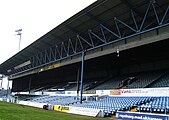Wikipedia:Main Page history/2020 January 16
From today's featured articleNinian Park was an association football stadium in the Leckwith area of Cardiff, Wales, that was the home of Cardiff City Football Club from 1910 to 2009, and of the Wales national football team from 1911 until the late 1980s. Named after Lord Ninian Crichton-Stuart, it was originally constructed with a single wooden stand and three large banks made of ash, but gradual improvements saw the construction of the Canton Stand, the Grange End, and the Popular Bank in addition to the grandstand (pictured). A record 62,634 fans watched a match against England on 17 October 1959, but the stadium's capacity was eventually reduced to 21,508 over safety concerns. The ground hosted its last match on 25 April 2009 against Ipswich Town and was demolished soon after, being replaced by the newly constructed Cardiff City Stadium located opposite. The site was converted into a residential housing estate named Ninian Park. (Full article...)
Recently featured:
Did you know ...
|
In the news
On this day
Isaac Komnenos (b. 1093) · Edward Gibbon (d. 1794) · Marjorie Williams (d. 2005)
More anniversaries:
|
Today's featured picture

|
|
Sunrise, Inverness Copse, is a 1918 artwork by the British war artist Paul Nash (1889–1946). It shows a desolate Western Front landscape at Inverness Copse, near Ypres in Belgium; the sun is rising over the hills to reveal shattered trees standing among mounds of earth and an expanse of mud, pock-marked by shell-holes and devoid of vegetation. The pen-and-ink drawing, with watercolour and chalk, is held by the Imperial War Museum in London. After a period serving in the Artists Rifles following the outbreak of the First World War, Nash was commissioned as an officer in the Royal Hampshire Regiment. He was sent to Flanders in February 1917, but was invalided back to London in May 1917, a few days before his unit was nearly obliterated at the Battle of Messines. Nash became an official war artist and returned to the Ypres Salient, where he was shocked by the devastation caused by war. In six weeks on the Western Front, he completed what he called "fifty drawings of muddy places". He later used this drawing as the basis for his 1918 oil painting We Are Making a New World. Drawing credit: Paul Nash
Recently featured:
|
Other areas of Wikipedia
- Community portal – Bulletin board, projects, resources and activities covering a wide range of Wikipedia areas.
- Help desk – Ask questions about using Wikipedia.
- Local embassy – For Wikipedia-related communication in languages other than English.
- Reference desk – Serving as virtual librarians, Wikipedia volunteers tackle your questions on a wide range of subjects.
- Site news – Announcements, updates, articles and press releases on Wikipedia and the Wikimedia Foundation.
- Village pump – For discussions about Wikipedia itself, including areas for technical issues and policies.
Wikipedia's sister projects
Wikipedia is hosted by the Wikimedia Foundation, a non-profit organization that also hosts a range of other projects:
Free media repository
Wiki software development
Wikimedia project coordination
Free textbooks and manuals
Free knowledge base
Free-content news
Collection of quotations
Free-content library
Directory of species
Free learning materials and activities
Free travel guide
Dictionary and thesaurus




